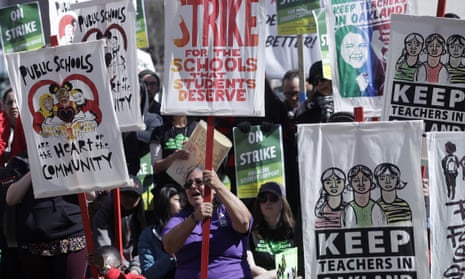The new school year has just begun and teachers across the US are preparing to continue the wave of strikes that made 2018 one of the biggest years for workers’ protest in a generation.
From Nevada to Illinois teachers are preparing to escalate a campaign that generated major victories last year, but that many say have been reneged on by local authorities and have still left teachers facing insurmountable problems.
Oklahoma was one of the states that led last year’s strikes and where teachers made significant gains. But a year on teachers still feel stretched to breaking point as they struggle with low pay, poor working conditions, and hostile Republican legislators.
“We did get an average $6,000 pay increase. That money was well received by teachers, we were extremely happy about it, but you have to keep in context that, based on the data, nothing has changed,” said Larry Cagle, president of Oklahoma Teachers United and a high school English teacher in Tulsa.
Oklahoma still suffers from a teacher shortage, class sizes remain too large, and Republicans opposed to publicly funded education still dominate state government despite some significant electoral victories in unseating legislators opposed to teacher demands, he said.
“My take home pay is $2,480 a month. It’s just not enough money. I’m sitting in a parking lot right now ready to go in to donate my plasma. I have to donate blood. I have to. I have kids in college,” Cagle added.
This year’s strikes look likely to start in Nevada, a state where right-wing lobbyists have fought a pitched battle with teachers unions to defund state education.
Teachers in Clark county, Nevada, the fifth-largest school district in the US with about 18,800 educators, have set a strike date for 10 September – despite the fact that the strike would be illegal under state law – if an agreement on a new contract with the district can’t be reached by then.
“We have the largest class sizes in the nation. Class sizes are out of control,” said Kristin Nigro, a kindergarten teacher at Schorr Elementary school in Las Vegas.
Nigro claimed Clark county school district has repeatedly reneged on contracts, and failed to pay promised raises to teachers over the past few years.
“We are doing this because we’ve been pushed to the brink,” said Nigro. “We’re the fifth largest school district in the nation and we don’t even have a set curriculum in place to vertically align our standards so these kids are successful.”

Teachers in the district who have invested significant time and money into obtaining extra training and education have been denied pay raises promised by the school district’s salary schedule.
“I paid $50,000 out of my own pocket to advance my career and make myself a better teacher, I’m just asking for the raise I was promised,” said Matthew Kranz, a high school math teacher who works a second job to make ends meet. “Three years later and two masters degrees, I haven’t even gotten a penny out of it. I’m actually making the same as someone fresh out of college.”
Clark county school district did not respond to multiple requests for comment. The district has filed a request for an injunction to prevent the strike.
In Chicago the teachers union in the second largest school district in the US has threatened a possible strike for months as new contract negotiations with recently elected Chicago Mayor Lori Lightfoot’s administration have stalled.
A fact-finder report on the new contract negotiations was released on 26 August and the union has 30 days until it can legally go on strike as contract negotiations continue.
“The fact-finder [report] did not make a useful contribution in terms of our ability to settle a contract,” said Jesse Sharkey, president of the Chicago Teachers Union. He cited wage recommendations that he said were too low and said other areas of concern were ignored in the report.
He said the negotiations were “the best opportunity we’ve had in decades to address an accumulated series of systematic shortfalls, austerity, cuts, and insults that the people in these schools have been forced to live under”.
“We are a school system that deals with large concentrations of poverty, many of our neighborhoods have record-setting levels of violence and other kinds of trauma and we really need to see resources in our classrooms in order to deliver a high quality education to everyone in Chicago,” he said.
Philip Cantor, a science teacher at North-Grand high school in Chicago, said resources were inequitably distributed throughout the district, with many schools without librarians, full-time school nurses, and understaffed substitute teachers.
“If the school can’t find a sub, teachers wind up having to sub for other teachers and they lose their preparation time,” Cantor said.
He added the district is also pushing to reduce preparation periods for elementary school teachers, and the district is mischaracterizing the wage increases while proposing to charge teachers more for healthcare.
“The district is saying there is this huge increase in pay, when actually it’s not. If you look at how its spread out over five years, it doesn’t take into account typical seniority increases and additional healthcare costs,” added Cantor. “Even though district healthcare costs have gone down, they want to charge us more.”
The Chicago Public Schools district said in a statement, “CPS is fully committed to reaching a fair contract as soon as possible. We believe the fact-finder report provides a strong framework for a fair deal, and we will do everything in our power to reach a fair deal and avoid any disruption to the school year.”

Last year, the largest teacher strikes in the United States occurred in West Virginia (35,000 workers), Kentucky (26,000 workers), and Oklahoma (45,000 workers). Though teachers in these states won significant victories from those work stoppages, many are still struggling and are weighing further action.
Teachers in West Virginia are currently drafting a lawsuit to oppose efforts by Republican state legislators to launch new charter schools in the state.
“We contend the charter schools go against the West Virginia constitution. It states clearly in our constitution that before you can have any new educational system it has to be voted on by the voters and we contend even though these charters are labeled public charter schools, in essence it creates a new school system,” said West Virginia Educators Association president Dale Lee.
He noted teachers are also bracing for legislation in the upcoming state session that would punish teachers for any future work stoppages and health insurance for teachers still requires proper funding past 2021.
In Kentucky, teachers are focused on trying to oust current Republican governor Matt Bevin in response to his opposition to teachers demands. The group is backing current Kentucky attorney general Andy Bashear for governor over Bevin, and teacher Jacqueline Coleman for lieutenant governor in the November 2019 election.
Earlier this year, teachers in the state conducted a sick-out to protest proposed teacher pension cuts. Bevin claimed in a recent interview the sick-out was an excuse for teachers to take paid time off work and his labor cabinet issued a statement on 16 August threatening civil recourse for any future work stoppages.
“Our governor constantly insults us, calls us names, says we’re selfish and short-sighted, ignorant, compared us to drowning victims who need to be knocked out to be saved, says we’re responsible for children being molested and using drugs and says he regrets none of what he has said about teachers. He’s a real gem,” said Jeni Bolander, a teacher in Fayette county, Kentucky and a member of the grassroots educator group Kentucky 120 United.
